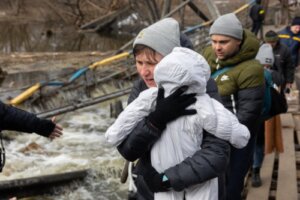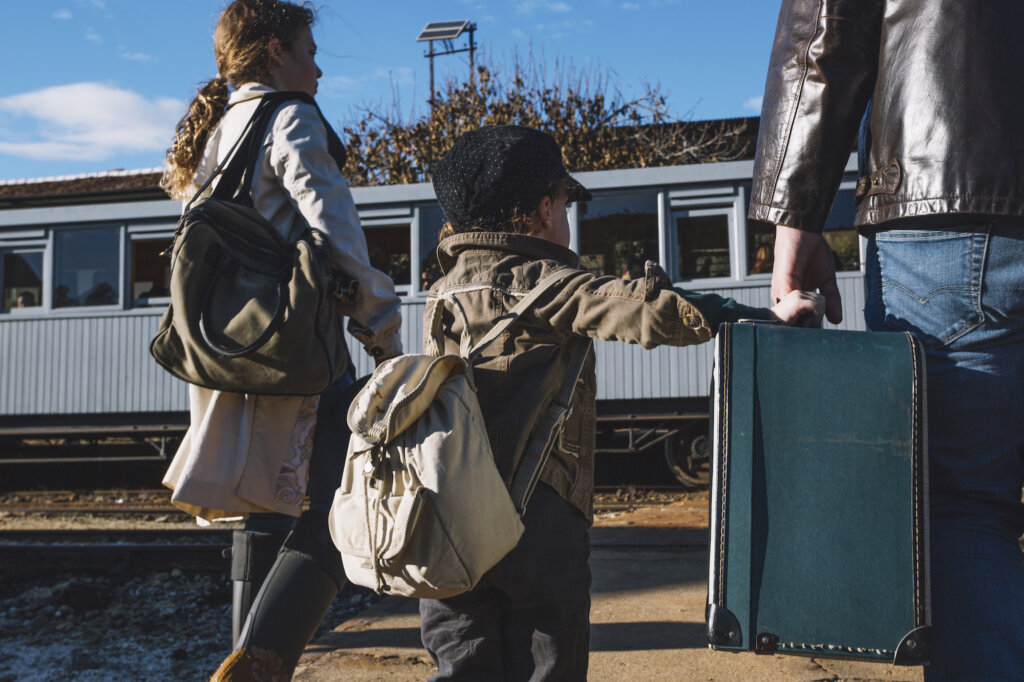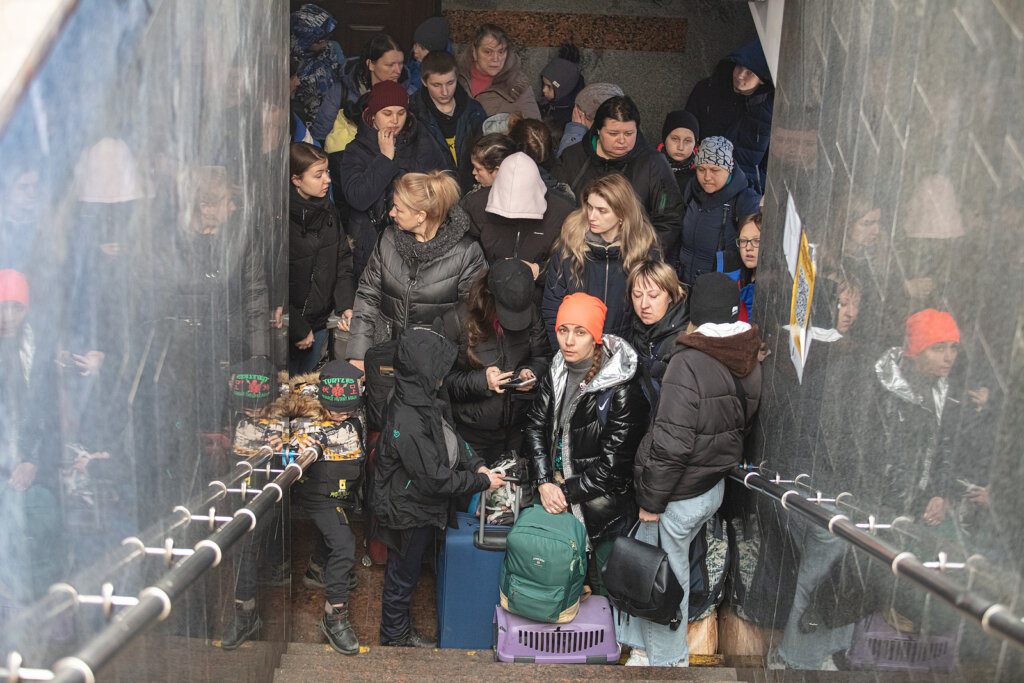Depression in War-Refugees


Written and verified by the psychologist Gorka Jiménez Pajares
Depression is a clinical entity with huge potential to end the slightest glimmer of hope. Bearing this in mind, could you imagine yourself in the shoes of a war refugee? Because, all over the planet, there are millions of human beings with nothing but their memories left of the homes they’ve been deprived of.
As a result of the barbarism of the current war in Ukraine, the number of refugees in Europe is increasing exponentially. When it comes to their psychological health, they come across innumerable barriers to accessing health care. These range from long bureaucratic procedures to the sociopolitical difficulties of the countries that have accepted them. Not forgetting the long periods of time that they may have lived in barracks in refugee camps.
Added to these factors is the fact that migrating is considered to be a potentially traumatic experience. Unsurprisingly, this is exacerbated by the context of war.
This set of factors: war, migration, precariousness in the camps, and the difficulty in accessing psychological interventions are the perfect breeding grounds for the development of clinical disorders. In this article, we’re going to focus on one of them: depression in war refugees (Lavdas et al., 2023).
“Sadness is a wall between two gardens.”
-Kahlil Gibran-
Migrating to avoid deadly war
According to a publication in the specialized journal, BMC Medicine (Kane et al., 2014) in refugee camps, doctors have to deal with a multitude of psychological health problems. For example, depression and substance abuse. But, what worries the refugees who’ve migrated to avoid war the most?
This question was addressed in research conducted by Michalis Lavdas and his team and published in BMC Psychiatry. They identified the following factors:
- Unemployment.
- Uncertainty.
- Acculturation.
- Loss of life.
- Deterioration in the social sphere.
- Economic worries.
- Being exposed to the context of war.
Fleeing from war is the starting point. Arriving at the refugee camp is just one more stop on the long journey. Moreover, in some camps, life is extremely hard, because the culture of the country of origin is completely different. Therefore, being in such a camp has a significant influence on the refugee. In fact, it involves a chaotic mixture of change, pain, and uncertainty.
“The arrival at a camp implies a slow process of adaptation to a new and unknown environment.”
-Miriam George-

Refugees from war and depression
Those who participated in the study by Lavdas et al (2023) reported feeling depressed. This was a product of the enforced harsh situations they saw and experienced. The phenomenon occurred both before the start of the war (when it was in the making) and once it had begun.
The experience these refugees went through in the camps aggravated the burdens they were already carrying. Moreover, researchers found that the symptoms of depression varied according to the sex of the sufferers.
“Being a refugee is not a choice, but a necessity to survive.”
-Angelina Jolie-
Gender violence: a constant for female war refugees
War refugees often come from countries where their rights are repeatedly denied, violated, and ignored. Dr. Lavdas explains that the fact of being born a woman tends to constitute a risk factor per se. He exemplifies the cases of marriage during childhood, which are frequent in certain cultures.
Life in the camp heralds the hope of a new home. However, despite perceiving greater security, other elements promoting depression often await in the place of refuge. These are uncertainty and the absence of activity (Lavdas et al., 2023)
Camp life is an intense turning point for male war refugees
As a result of exacerbated and relentless violence before their migration, male refugees frequently reported negative emotions such as anguish. This was more apparent after witnessing dreadful acts like murders or explosions.
Moreover, after their arrival at a camp, a place that should’ve been a beacon of light, progress, and freedom, they encountered diametrically opposed factors. For example, confinement, isolation, and conflict (Lavdas et al., 2023).
In addition to the circumstances that promoted depressive symptoms, refugees experienced an absence of meaningful activities, resulting in ‘long and endless’ days. Furthermore, they had the mental burden of ‘having to attend to the needs of their families’.

Inactivity and demotivation
Refugees leave their countries to try and survive deadly and destructive wars that devastate all hope for the future. They flee with backpacks that are full of anguish and concern for their own survival, but also for their children and other vulnerable people for whom they were responsible up until now.
The inactivity we mentioned earlier is also closely linked to depressive symptoms. In fact, it often becomes a vicious circle. It derives from a lack of motivation, the absence of intimate and significant interactions with other people, and the loss of pleasure in everyday things.
Therefore, improving the characteristics of refugee camps is essential. Providing refugees with direct psychological help also implies giving them tasks and activities that they may consider to be significant and important. After all, an individual who feels that life has meaning is a little more prepared to face its ups and downs.
“Refugees are like everyone else, with dreams and hopes, and they deserve a chance to build a better life.”
-David Miliband-
Depression is a clinical entity with huge potential to end the slightest glimmer of hope. Bearing this in mind, could you imagine yourself in the shoes of a war refugee? Because, all over the planet, there are millions of human beings with nothing but their memories left of the homes they’ve been deprived of.
As a result of the barbarism of the current war in Ukraine, the number of refugees in Europe is increasing exponentially. When it comes to their psychological health, they come across innumerable barriers to accessing health care. These range from long bureaucratic procedures to the sociopolitical difficulties of the countries that have accepted them. Not forgetting the long periods of time that they may have lived in barracks in refugee camps.
Added to these factors is the fact that migrating is considered to be a potentially traumatic experience. Unsurprisingly, this is exacerbated by the context of war.
This set of factors: war, migration, precariousness in the camps, and the difficulty in accessing psychological interventions are the perfect breeding grounds for the development of clinical disorders. In this article, we’re going to focus on one of them: depression in war refugees (Lavdas et al., 2023).
“Sadness is a wall between two gardens.”
-Kahlil Gibran-
Migrating to avoid deadly war
According to a publication in the specialized journal, BMC Medicine (Kane et al., 2014) in refugee camps, doctors have to deal with a multitude of psychological health problems. For example, depression and substance abuse. But, what worries the refugees who’ve migrated to avoid war the most?
This question was addressed in research conducted by Michalis Lavdas and his team and published in BMC Psychiatry. They identified the following factors:
- Unemployment.
- Uncertainty.
- Acculturation.
- Loss of life.
- Deterioration in the social sphere.
- Economic worries.
- Being exposed to the context of war.
Fleeing from war is the starting point. Arriving at the refugee camp is just one more stop on the long journey. Moreover, in some camps, life is extremely hard, because the culture of the country of origin is completely different. Therefore, being in such a camp has a significant influence on the refugee. In fact, it involves a chaotic mixture of change, pain, and uncertainty.
“The arrival at a camp implies a slow process of adaptation to a new and unknown environment.”
-Miriam George-

Refugees from war and depression
Those who participated in the study by Lavdas et al (2023) reported feeling depressed. This was a product of the enforced harsh situations they saw and experienced. The phenomenon occurred both before the start of the war (when it was in the making) and once it had begun.
The experience these refugees went through in the camps aggravated the burdens they were already carrying. Moreover, researchers found that the symptoms of depression varied according to the sex of the sufferers.
“Being a refugee is not a choice, but a necessity to survive.”
-Angelina Jolie-
Gender violence: a constant for female war refugees
War refugees often come from countries where their rights are repeatedly denied, violated, and ignored. Dr. Lavdas explains that the fact of being born a woman tends to constitute a risk factor per se. He exemplifies the cases of marriage during childhood, which are frequent in certain cultures.
Life in the camp heralds the hope of a new home. However, despite perceiving greater security, other elements promoting depression often await in the place of refuge. These are uncertainty and the absence of activity (Lavdas et al., 2023)
Camp life is an intense turning point for male war refugees
As a result of exacerbated and relentless violence before their migration, male refugees frequently reported negative emotions such as anguish. This was more apparent after witnessing dreadful acts like murders or explosions.
Moreover, after their arrival at a camp, a place that should’ve been a beacon of light, progress, and freedom, they encountered diametrically opposed factors. For example, confinement, isolation, and conflict (Lavdas et al., 2023).
In addition to the circumstances that promoted depressive symptoms, refugees experienced an absence of meaningful activities, resulting in ‘long and endless’ days. Furthermore, they had the mental burden of ‘having to attend to the needs of their families’.

Inactivity and demotivation
Refugees leave their countries to try and survive deadly and destructive wars that devastate all hope for the future. They flee with backpacks that are full of anguish and concern for their own survival, but also for their children and other vulnerable people for whom they were responsible up until now.
The inactivity we mentioned earlier is also closely linked to depressive symptoms. In fact, it often becomes a vicious circle. It derives from a lack of motivation, the absence of intimate and significant interactions with other people, and the loss of pleasure in everyday things.
Therefore, improving the characteristics of refugee camps is essential. Providing refugees with direct psychological help also implies giving them tasks and activities that they may consider to be significant and important. After all, an individual who feels that life has meaning is a little more prepared to face its ups and downs.
“Refugees are like everyone else, with dreams and hopes, and they deserve a chance to build a better life.”
-David Miliband-
All cited sources were thoroughly reviewed by our team to ensure their quality, reliability, currency, and validity. The bibliography of this article was considered reliable and of academic or scientific accuracy.
- George M. Application of conservation of resource theory with camp refugees. Migr Dev. 2017;6(3):460–478. doi: 10.1080/21632324.2017.1320825 https://www.tandfonline.com/doi/abs/10.1080/21632324.2017.1320825
- Kane, J.C., Ventevogel, P., Spiegel, P. et al. Mental, neurological, and substance use problems among refugees in primary health care: analysis of the Health Information System in 90 refugee camps. BMC Med 12, 228 (2014). https://bmcmedicine.biomedcentral.com/articles/10.1186/s12916-014-0228-9#citeas
- Lavdas M, Guribye E, Sandal GM. “Of course, you get depression in this situation”: Explanatory Models (EMs) among Afghan refugees in camps in Northern Greece. BMC Psychiatry. 2023 Feb 27;23(1):125. doi: 10.1186/s12888-023-04613-2. PMID: 36843000; PMCID: PMC9968643. https://pubmed.ncbi.nlm.nih.gov/36843000/
This text is provided for informational purposes only and does not replace consultation with a professional. If in doubt, consult your specialist.







